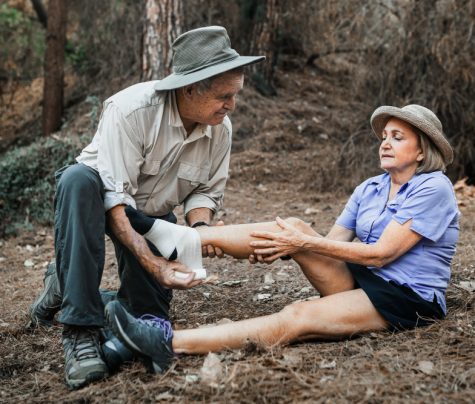
Whenever someone sees another person in distress, the urge to help becomes instinctive.
Such instincts can save a life, but good intentions may sometimes go awry, leading to complications.
Very often, well-meaning efforts that inadvertently lead to injury can lead to legal complications.
Good Samaritan laws protect well-meaning individuals who assist others during an emergency from liability as long as the actions taken are reasonable and performed to aid.
Hi, in today’s blog, I will explain how these laws work in California and help you understand the definition of the Good Samaritan law. Keep reading.
What Are Good Samaritan Laws?
Good Samaritan laws protect the person attempting to assist another individual in an emergency.
Such laws aim to increase confidence in assisting others by removing the fear of being sued if an unintended injury occurs.
Sometimes known as volunteer protection laws, they cover ordinary people and, in some instances, medical personnel.
These statutes reveal a fundamental policy in the public interest: it is necessary to encourage voluntary assistance.
“Everyone appreciates a helping hand. This is especially true when in a situation where their lives could depend on a good Samaritan,”
says California personal injury lawyer Jimin Oh of Solution Now Law Firm.
7 Types Of Different Situations That Good Samaritan Laws Cover
I think by now you have understood the overall purpose of the good samaritan law! Now, it is time to become familiar with all the situations where this law can be applied!
1. Medical emergencies
Quick actions have always been a great instrument for saving lives during any sort of medical emergency. Time is the real essence.
So, whether it is about a basic first aid need or assisting someone to administer medication, you are always free to step up when help is needed!
2. Accidents and Injuries
This law covers car accidents, head injuries, or any other kind of traumatic event. It can protect you from the render aid.
Imagine you just stepped up to move victims out of the harmful place or just provide first aid until the professional help is on the way! In such cases, the law will protect you.
However, it is not recommended that individuals be moved from an accident spot. What you can do is to remove all the hazardous stuff to help the victim.
3. Cardiopulmonary resuscitation or CPR
CPD has always played a very crucial role during a cardiac arrest. So, if you administer is in good faith, you are mostly safe from all kinds of consequences.
On top of that, by administering you are actually increasing the survival chance of the victim.
So, it is good to equip yourself with the proper CPR training. Trust me! It can definitely save many lives.
4. Drug overdose
Let’s say you have spotted someone down the alley who is suffering a drug overdose. The good samaritan law allows you to administer naloxone and overdose-reversal medications.
You can also perform other life-saving measurements such as CPR or placing the victim in a recovery position.
5. Psychiatric emergencies
Emergency situations do not limit themselves to personal or physical injuries. Let’s say someone is having a panic attack or they are trying to harm themselves!
In that case, the law always protects you to do the deeds. You can step up and calm them down, provide them with emotional support, and provide them with mental health resources.
6. Childbirth
Childbirth in public places can be an unfortunate event, but it does occur. The rate of childbirth in public places has been increasing among the homeless population in California.
| As per the data of January 2024, more than 187000 people live on the streets or in Shelters. |
Once you start to encounter such incidents, the law allows you to protect the mother and further help her with the delivery process.
7. Automated external defibrillator (AED) use
The good samaritan laws empower you to administer the life-saving electrical therapy to save the victims who are suffering from cardiac arrests.
Exceptions to Good Samaritan Laws
California’s good Samaritan laws tend to provide quite substantial protection. However, they do not come without exceptions.
Acts of gross negligence or willful misconduct during an attempt to assist are not protected under these laws.
Also, if anyone provides care beyond their training, for example, attempting medical procedures if they have never been trained in them, they too would be liable.
Helpers are only obligated to stay with the fundamentals: first aid and common sense.
Knowing these nuances will ensure that your well-intentioned efforts continue to be protected by the law and keep safety at the forefront.
Laws On Failure to Act
Some states have laws concerning failure to act, also known as bad Samaritan laws, which make providing first aid a legal requirement for onlookers.
Some states, like Louisiana, Minnesota, Rhode Island, and Vermont, require bystanders to assist reasonably during an emergency. If not, criminal charges may be imminent.
California does not have specific failure-to-act statutes that demand action from a witness in such an event of an emergency.
While California might wish for all its citizens to be Good Samaritans, it will not punish an individual who simply decides not to act.
The emphasis is on providing incentives to assist rather than punitive measures that may lead to failing to act.
These distinctions make sense of what one has to do if an accident happens unexpectedly; action is encouraged but never legally enforced here.
How a Personal Injury Lawyer Can Help
When a complaint arises and the defendant seeks to invoke Good Samaritan laws as their defense, the presence of a personal injury lawyer at the appropriate time may have great consequences.
The lawyers have in-depth knowledge of these laws’ complexities and their applicability to specific incidents.
They can assist in gathering evidence to counter the defendant’s claim and establish negligence or misfeasance.
Additionally, attorneys can analyze whether the actions taken during the emergency were reasonable.
Their expertise helps ensure that one receives a fair deal of compensation from the courts. With legal guidance, complex defenses can be more manageable, thus enabling one to get on with recovery while protecting one’s rights effectively.
Final Thoughts
Good Samaritan laws motivate individuals to help somebody at an emergency site.
They protect persons acting with good intentions while pointing out the importance of understanding their limitations.
Knowing your rights and responsibilities will enable you to assist when necessary. While California does not enforce any failure-to-act laws, helping others is quite noble; just act reasonably and within your capabilities for everyone’s safety.
Read More:
- Madison’s Leading Car Accident Law Firm
- Determining Fault in a Florida Car Accident
- Recovering from a Car Accident in Port St. Lucie: Legal Support for Your Claim











0 Reply
No comments yet.